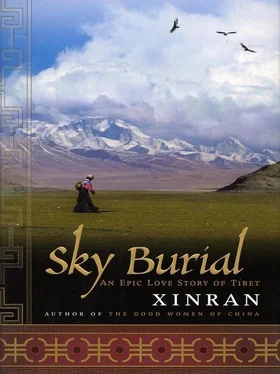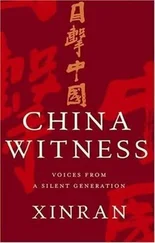Wen and the rest of the company had no idea what was being said, but they were sure Zhuoma was trying to work out a way to save them. After many tense minutes, Zhuoma returned. The Tibetans, she said, wished to punish them. On its way westward, the People’s Liberation Army had extinguished the eternal flames in the monasteries and killed many of their herdsman. The Tibetans believed that 231 herdsman had been lost and they intended to take double that number of Chinese lives in compensation. Though Zhuoma had tried to negotiate with them, they refused to be merciful, arguing that to release the Chinese would allow them to kill more Tibetans. However, the Tibetan leader had said he would give them a chance if they agreed to three conditions. First, the Tibetans wanted to take ten Chinese as hostages, to be killed if the Liberation Army killed any more of their people; second, they wished the Chinese to return to their lands in the east and never to take another step westward again; third, the Chinese must leave behind all their weapons and equipment, including their trucks.
The radio operator argued that having to walk back with no food or water was no different from dying. Zhuoma told him that the Tibetans were prepared to leave them some dried meat.
All this time, the company commander had been very silent. Now he asked Zhuoma to return to the Tibetans and request permission for him to hold a meeting with his men. It was not long before Zhuoma came back. “They agree,” she said. “You are to put your weapons on the ground and stand over there.”
The commander unbuckled his gun belt, gently laid it on the ground, then turned to address his men.
“All Party members put their weapons on the ground as I have, and then follow me over there for a meeting. The rest remain here.”
Twenty or thirty soldiers left the silent crowd, watched by the Tibetans. Several minutes later, some of the men returned to the ranks but twelve remained by the commander. The commander asked Zhuoma to tell the Tibetans that, although they had requested ten hostages, twelve Party members wished to live and die together. They would therefore provide an additional two hostages. Clearly moved by the self-sacrifice of the two extra hostages, the Tibetans gave the departing Chinese not only the promised meat, but a few waterskins and knives.
The two women remained behind with the Tibetans. Wen had told Zhuoma something of her search for Kejun and her desire to head north toward Qinghai. Through Zhuoma’s influence, the leader of the Tibetans had agreed to let them accompany his men westward. When the time came for the women to go north, he would give them a guide. As Wen sat behind Zhuoma on one of the Tibetans’ horses, clinging to her waist for dear life, she asked how Zhuoma had managed to negotiate with the Tibetans. Zhuoma explained that her ornaments identified her as the head of an estate. Although Tibetans were divided into many different groups, each with its own culture and customs, they all made sacrifices to Buddha, and all leaders had identical ornaments, which were a symbol of their power. The leader of the Tibetans had immediately recognized her superior status. She was glad to have been able to use her power to help Wen, because she owed the Chinese menba her life.
The group journeyed west for four and a half days. The leader then came to Zhuoma and Wen and told them that if they still wished to go to Qinghai, it was here that they should head north. They had just stopped to pack food and water for the women when three messengers on horseback came flying toward them reporting that the Chinese cavalry was up ahead. The Tibetan leader immediately ordered his men to hide their horses in the undergrowth nearby and Zhuoma guided their horse to follow.
In the thicket, Wen could not help being excited at having come across Chinese forces so unexpectedly. Perhaps Kejun would be among them. Her elation was soon quelled by the fury on the faces of the Tibetans, and the sight of the twelve Chinese hostages being led into a mountain pass. Terrified, she watched as a large unit of Chinese cavalry pursued and killed the few Tibetans who had not hidden themselves quickly enough. Gunfire was all around. Men fell from their horses, spouting blood. Wen grasped Zhuoma’s hand, trembling at the gruesome scene. The Tibetan woman’s hand was clenched.
Light drained from the sky. When the Tibetan leader finally gave the order that it was safe to move on, it was pitch-dark. Wen could feel the anxiety in Zhuoma’s body as she urged their horse to keep up with the rest. But the wind and the darkness conspired to separate them from their companions. As they struggled onward through the gale, the horse suddenly gave a long, frightened whinny and threw them from its back. Seconds later they heard a thud as its body hit the bottom of a ravine. By throwing them, it had loyally saved them from certain death. Stunned, they sat with their arms around each other in the wild wind, hardly able to believe they were still alive. Wang Liang’s words flashed through Wen’s mind: “War gives you no time to study and no chance to adapt.”
Still floating somewhere between life and death, Wen struggled to open her eyes. She was lying on the ground, but she was warm and comfortable. A shaft of strong light was beating down from above, making it difficult to see anything around her. With great effort she moved her weak body. Instinct told her that every part of her was there, but her head felt strangely absent.
“Is this the sun of the human world,” Wen asked herself, “or the holy radiance of heaven?”
A familiar face was bending over her.
“How are you, menba?” It was Zhuoma.
“Zhuoma?” Wen could feel herself returning to the land of the living. “Where are we?”
“We are in the home of a nomad family; this is their tent. Luckily for us, we had walked to the edge of the lowlands, where they have spent the winter. You collapsed. I don’t know what I would have done if Gela, the head of the family, hadn’t noticed us.”
Wen tried to heave herself up.
“Don’t move,” Zhuoma warned. “They’ve put some ointment on your forehead. How are you feeling?”
“My pack…” Wen felt around the ground where she was lying for the bundle of possessions that she had carried so carefully from Zhengzhou.
“It’s lost,” said Zhuoma. “But the book you were carrying in your pocket is safe. I’ve put it beside your pillow. It must mean a lot to you. Even when you were unconscious, you were holding on to it.”
A young girl of eleven or twelve entered the tent carrying an earthenware bowl, shyly handed it to Zhuoma, then ran back out again. Zhuoma told Wen that the bowl contained freshly drawn water, brought in by one of the daughters. The rest of the family were outside the tent working. They were planning to move on to spring pastures shortly, but in the meantime Wen could stay here and rest.
“But how can I possibly impose myself on these people?” Wen asked. “Surely they have enough difficulties in their life without the burden of a sick person.”
“The Tibetan people open their homes to all travelers,” said Zhuoma quietly, “whether they are rich or poor. It is the tradition of our country.” Then she went out to talk further with the family.
As soon as she was gone, Wen opened her book of Liang Shiqiu’s essays and drew out Kejun’s photograph. Amid all this strangeness, he was still smiling at her. She then took the opportunity to gaze at the extraordinary dwelling in which she found herself. The four-sided tent was made from large pieces of coarse material woven from animal hair and supported by sturdy wooden pillars. At its apex was a skylight, which could be opened and closed by means of a flap. This was the origin of the shaft of light that had blinded Wen when she woke. Now she watched the smoke from the cooking stove dancing in and out of the light. The simple stove, made from a large, boat-shaped stone raised from the ground on two small rocks, sat in the center of the tent. Beside it were a pair of bellows and stacks of brightly painted bowls, dishes, and jars, along with a few household items Wen could not put a name to. On one side of the tent, Wen spotted what must be the family’s altar. Above a table set with religious objects hung an image of a Tibetan Buddha embroidered in colored brocade. To the right was a large cylindrical object made of bronze. Farther along there was a heap of felts and rugs, quilts and clothes. And on the other side of the altar, sacks filled with something that smelled like animal dung were piled high. The door to the tent was a flap through which an adult would have to stoop to enter. On either side of this flap were arranged a variety of household tools and equipment for animals.
Читать дальше












